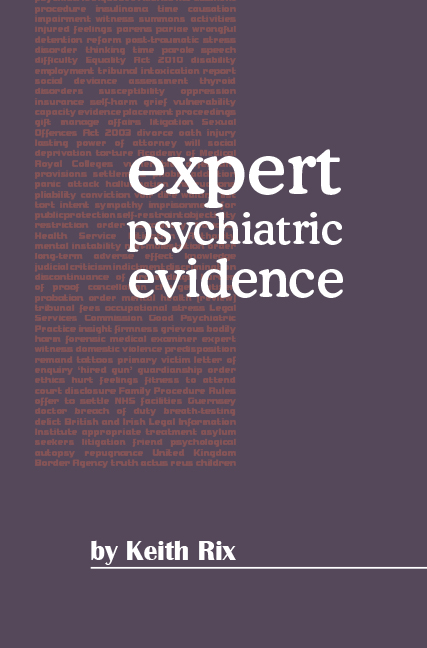Book contents
- Frontmatter
- Dedication
- Contents
- Foreword
- Preface and acknowledgements
- List of boxes
- Statutes, statutory instruments and codes cited in the text
- List of cases and practice directions
- List of abbreviations
- 1 Nature and duties of an expert witness
- 2 Training, contractual, administrative and other practical matters
- 3 The medico-legal consultation
- 4 The structure, organisation and content of the generic report
- 5 Reports for criminal proceedings
- 6 Reports in personal injury cases
- 7 Reports for family proceedings relating to children
- 8 Reports in cases involving capacity
- 9 Reports for tribunals, inquests and other bodies
- 10 Reports for the Channel Islands, the Republic of Ireland, the Isle of Man, Northern Ireland and Scotland
- 11 Going to court
- 12 Maintaining and developing expertise and knowing when to stop
- References
- Appendices
- Index
- Frontmatter
- Dedication
- Contents
- Foreword
- Preface and acknowledgements
- List of boxes
- Statutes, statutory instruments and codes cited in the text
- List of cases and practice directions
- List of abbreviations
- 1 Nature and duties of an expert witness
- 2 Training, contractual, administrative and other practical matters
- 3 The medico-legal consultation
- 4 The structure, organisation and content of the generic report
- 5 Reports for criminal proceedings
- 6 Reports in personal injury cases
- 7 Reports for family proceedings relating to children
- 8 Reports in cases involving capacity
- 9 Reports for tribunals, inquests and other bodies
- 10 Reports for the Channel Islands, the Republic of Ireland, the Isle of Man, Northern Ireland and Scotland
- 11 Going to court
- 12 Maintaining and developing expertise and knowing when to stop
- References
- Appendices
- Index
Summary
The court must always be on the guard against the over-dogmatic expert, the expert whose reputation or amour proper is at stake, or the expert who has developed a scientific prejudice. (R v Cannings [2004] EWCA Crim 1)
Avoiding it
The best way to avoid going to court is to produce a report that enables the parties to settle the case or which is so straightforward that in a criminal case parts of it are read to the jury or it is read by the judge without your having to attend.
You can also avoid going to court by producing a report upon which those instructing you do not seek to rely and which they do not disclose. But two cases are informative here.
Dr Harry Egdell discovered that his independent mental health tribunal report was not being disclosed to the tribunal considering a patient's application for a conditional discharge. In the meantime the patient had withdrawn his application to the tribunal. Dr Egdell asked his instructing solicitors for permission to send a copy to the hospital's assistant medical director. The solicitors refused. Dr Egdell readdressed the report to the assistant medical director and sent it to him. A copy went to the Home Office and the Home Office referred the case to a tribunal under s.72(2) of the MHA. The patient brought claims against Dr Egdell and others. They were dismissed by the first-instance judge. The patient appealed unsuccessfully (W v Egdell and Others [1990] 4 BMLR 1990). Sir Stephen Brown P, held that:
The balance of the public interest clearly lay in the restricted disclosure of vital information to the director of the hospital and to the secretary of state who had the onerous duty of safeguarding public safety.
Bingham LJ gave a concurring judgment:
A consultant psychiatrist who becomes aware, even in the course of a confidential relationship, of information which leads him, in the exercise of what the court considered a sound professional judgment, to fear that such decisions may be made on the basis of inadequate information and with a real risk of consequent danger to the public is entitled to take such steps as are reasonable in all the circumstances to communicate the grounds of his concern to the responsible authorities.
- Type
- Chapter
- Information
- Expert Psychiatric Evidence , pp. 214 - 227Publisher: Royal College of PsychiatristsFirst published in: 2017

